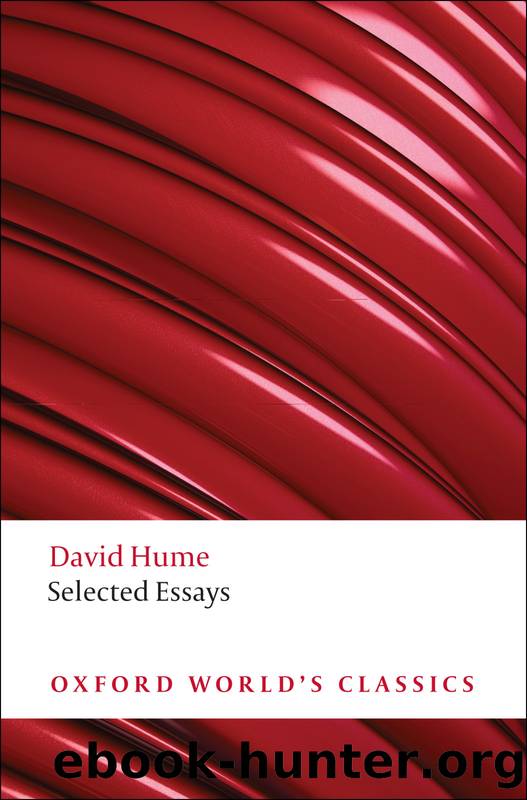Selected Essays by Hume David; Copley Stephen; Edgar Andrew

Author:Hume, David; Copley, Stephen; Edgar, Andrew
Language: eng
Format: epub
Publisher: Oxford University Press, UK
Published: 1998-03-14T16:00:00+00:00
OF PUBLIC CREDIT
IT appears to have been the common practice of antiquity, to make provision, during peace, for the necessities of war, and to hoard up treasures beforehand as the instruments either of conquest or defence; without trusting to extraordinary impositions, much less to borrowing in times of disorder and confusion. Besides the immense sums above mentioned,â which were amassed by ATHENS, and by the PTOLEMIES, and other successors of ALEXANDER; we learn from PLATOâ that the frugal LACEDEMONIANS had also collected a great treasure; and ARRIANâ and PLUTARCHâ take notice of the riches which ALEXANDER got possession of on the conquest of SUSA and ECBATANA, and which were reserved, some of them, from the time of CYRUS. If I remember right, the scripture also mentions the treasure of HEZEKIAH and the JEWISH princes;* as profane history does that of PHILIP and PERSEUS, kings of MACEDON. The ancient republics of GAUL had commonly large sums in reserveâ Every one knows the treasure seized in ROME by JULIUS CAESAR,* during the civil wars: and we find afterwards, that the wiser emperors, AUGUSTUS, TIBERIUS, VESPASIAN, SEVERUS, etc. always discovered the prudent foresight of saving great sums against any public exigency.
On the contrary, our modern expedient, which has become very general, is to mortgage the public revenues, and to trust that posterity will pay off the incumbrances contracted by their ancestors: and they, having before their eyes so good an example of their wise fathers, have the same prudent reliance on their posterity; who, at last, from necessity more than choice, are obliged to place the same confidence in a new posterity. But not to waste time in declaiming against a practice which appears ruinous beyond all controversy, it seems pretty apparent, that the ancient maxims are, in this respect, more prudent than the modern; even though the latter had been confined within some reasonable bounds, and had ever, in any instance, been attended with such frugality, in time of peace, as to discharge the debts incurred by an expensive war. For why should the case be so different between the public and an individual, as to make us establish different maxims of conduct for each? If the funds of the former be greater, its necessary expenses are proportionably larger; if its resources be more numerous, they are not infinite; and as its frame should be calculated for a much longer duration than the date of a single life, or even of a family, it should embrace maxims, large, durable, and generous, agreeably to the supposed extent of its existence. To trust to chances and temporary expedients, is, indeed, what the necessity of human affairs frequently renders unavoidable; but whoever voluntarily depend on such resources, have not necessity, but their own folly to accuse for their misfortunes, when any such befall them.
If the abuses of treasures be dangerous, either by engaging the state in rash enterprises, or making it neglect military discipline, in confidence of its riches; the abuses of mortgaging are more certain and inevitable; poverty, impotence, and subjection to foreign powers.
Download
This site does not store any files on its server. We only index and link to content provided by other sites. Please contact the content providers to delete copyright contents if any and email us, we'll remove relevant links or contents immediately.
The Power of Myth by Joseph Campbell & Bill Moyers(925)
Half Moon Bay by Jonathan Kellerman & Jesse Kellerman(911)
A Social History of the Media by Peter Burke & Peter Burke(880)
Inseparable by Emma Donoghue(844)
The Nets of Modernism: Henry James, Virginia Woolf, James Joyce, and Sigmund Freud by Maud Ellmann(739)
The Spike by Mark Humphries;(719)
A Theory of Narrative Drawing by Simon Grennan(707)
The Complete Correspondence 1928-1940 by Theodor W. Adorno & Walter Benjamin(704)
Ideology by Eagleton Terry;(659)
Bodies from the Library 3 by Tony Medawar(649)
Culture by Terry Eagleton(646)
World Philology by(645)
Farnsworth's Classical English Rhetoric by Ward Farnsworth(641)
A Reader’s Companion to J. D. Salinger’s The Catcher in the Rye by Peter Beidler(614)
Adam Smith by Jonathan Conlin(608)
High Albania by M. Edith Durham(592)
Game of Thrones and Philosophy by William Irwin(592)
Comic Genius: Portraits of Funny People by(581)
Monkey King by Wu Cheng'en(577)
